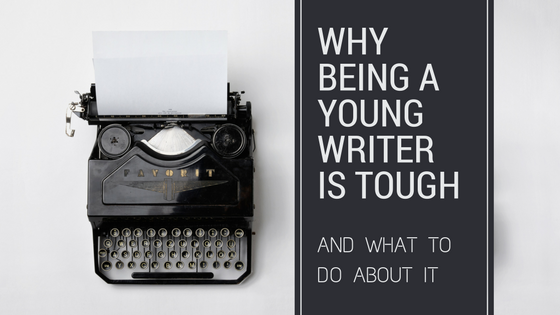Today I saw an old article in the Guardian about how older writers aren’t celebrated as much as younger writers. I agree that the ‘under forty’ category is a bit pointless, but it got me thinking about something that’s been on my mind for a while.
Writing at any age is a challenge. It’s just as impressive to write or even publish a book at sixty-five as thirty-five and I wouldn’t want to take away from that. However, there are some difficulties young writers (teens to early twenties) face that older people don’t in the same way. I wanted to share my thoughts on them, and what we can do to help ourselves.
1. School – if you’re a young person, chances are you’ll be in school, college, university or some other form of education. This is great, except you’ve got lessons dictating what you do during the day and endless homework and assignments taking up your evenings and weekends. Obviously, most adults have jobs and some jobs will require extra work being done at home. The main difference is that adults have a lot more choice over what work they do and when and have the experience to prioritise what they do effectively. In school, you’ve got every teacher telling you that their homework is the most important and it can get hard to work out where to even start sometimes, let alone write that scene you’ve been daydreaming about in class. Luckily, there are a few simple things that can help:
- Stop daydreaming in class. I know, it’s much more interesting than photosynthesis or whatever you’re studying, but it makes things harder in the long run. Learn as much as you can during school time and it’ll make homework and revision easier, leaving more time to actually write.
- Use every moment. Do you have break/lunch times? Find a quiet corner or empty computer and write (as long as you eat lunch as well.) Do you get to school early, or have to stay late? Then write. I used to get really annoyed about getting to school almost an hour earlier than I needed to some days, but then I started using that time to write and now I look forward to those mornings.
- Make a plan. Another point that sounds like it’s from your teacher, but seriously, if you know when you’re going to do your school work and when you’re going to write it’ll help you stick to doing both. I’m not saying note down every minute of the day because life is unpredictable, but at least having a routine can make a huge difference.
2. Home – under eighteen and you’re likely to still be living at home. This might seem a bit of an odd one as it means you have less to worry about in the survival department, but it also means you have a lot less control over your time than a thirty-year-old living alone would have. When your family decides you’re going out somewhere, usually you’ve got to go and nevermind the hour’s writing session you had planned that afternoon. If this is something that happens regularly to you (it certainly does to me) then try these tips I’ve found helped me:
- Work earlier in the morning. I prefer to work in the afternoon on weekends but after my plans to write were pushed aside again and again I decided to make a change. Get your writing in before your family decides to go anywhere and you can enjoy going out without any guilt.
- Talk to your family. Let them know how important your writing is to you if you’re comfortable with that. Ask them to tell you the day before if they think they want to go out so you can plan around it. Remember to be polite, and hopefully they’ll understand.
- Stay home. If you really need to write that day then sometimes politely asking if you can sit this one out is all it takes. This gets more effective as you get older, especially if they can see you really are working hard while alone.
3. Confidence – everyone doubts themselves sometimes, but adults have a lot more experience in overcoming it and this is a major problem for young writers. How many more stories would the world have if more people had to self-belief to release them? It’s hard to put the words to paper and even harder to promote what you’re doing the way authors need to when you’re surrounded on all sides by people who seem to be doing it way better than you ever could. Here are some ideas on how to make sure you can compete:
- Do your research. Make sure you know everything about everything to do with writing, books, marketing… the whole shebang. Read every blog and every book about it you can get your hands on. Be knowledgeable about whatever your book is about and always be prepared to share.
- Be professional. Don’t give anyone the opportunity to look down on you just because you’re young. Make sure all your social media looks the part of an author already, even if you haven’t written a word yet. Look at those authors who seem to have it together. Study them, work out what they do and then do it better. Always be genuine, but never talk yourself down.
Ask for help. Make friends with other young authors. Make friends with established older authors. Ask them for tips and share your own. Learn from those who know what they’re doing and soon you will too.
4. Cost – this one is more for young people like myself who are planning to self-publish their book. Self-publishing is a great pathway for young writers because it’s completely free. However, the cost is still a barrier. Many companies will charge hundreds, even thousands of pounds for book publishing packages, but they are also dogged by allegations of scams and dishonesty. Even without honest companies, there are still costs such as editors and cover design. I will not be paying for any professional assistance when I self-publish my romance novella, but that is because it is part of the extended project qualification I’m undertaking. I wholeheartedly believe it’s worth investing in professional services under normal circumstances but they can be expensive and as a young person, even if you do have a job it’s still a lot of money invested with no guaranteed return. There are a few things you can do to help with this:
- Do as much as you can yourself – edit rigorously. Then edit some more. You won’t be able to pick out every typo yourself, but you can damn well try. Everything you correct yourself means less work for an editor and that means you won’t have to pay so much. If you have even basic IT skills, try designing your own cover before splashing out on a professional. At the very least it’ll give you an idea of what you want. If you’re happy enough with what you’ve got you could use that for your eBook and update the cover later on when you’ve saved up some money.
- Ask for help – find people to beta-read for you. The Instagram writing community is great for this. They can help spot errors you couldn’t see yourself. Ask a friend who knows graphic design for tips for your cover. Again, ask people who know more than you for help. People are kinder than you expect and love to share what they know.
- Pinch pennies – this one is obvious I suppose, but if you really want to see this story published, you’ll do what it takes to get there. Save up all the money you can. Use a crowdfunding campaign even. There are dedicated websites where authors can raise money for this exact purpose, so make the most of all the tools you have available.
5. Age – this is the point I’ve been thinking about a lot and I’d be really interested to hear other people’s thoughts on this. By being younger we have an inherent disadvantage compared to older authors. I’m seventeen. I’ve been writing on and off for six years and seriously for about two and a half. I’ve had seventeen years to absorb how stories work, to collect experiences and form a view of the world I need to share. A thirty-four-year-old has had twice the time I have to do all that and more. Furthermore, the brain doesn’t stop developing until around the mid-twenties. This may seem obvious to some people but when I realised all this it really threw me. I worried about how I could possibly compete with people so much older and more experienced in both writing and life. At first it felt impossible, but here’s what I realised I had to do:
- Read everything – to write well we need to understand stories. To understand stories we need to experience as many as possible, so read as widely as possible. Think about what you’ve read and how you’d make it better. Some adults have had over twice as much time as us to read, so we’ve got a lot of catching up to do.
- Work hard – some days I don’t want to write. I do anyway. That’s what professionals do so that’s what we need to do. Of course, taking care of yourself comes first and it’s better to take a break and recover than burnout but I’m talking about when I’d much rather keep watching Hamilton animatics than outline another chapter. It’s times like that you need willpower and to keep in mind your goal. Think about how it’ll feel to have that finished story and it won’t feel so hard.
- Make friends – until recently, writing was a solitary pursuit for me. I had no idea of the amazing writing communities out there, but once I got involved I loved it. There’s something to learn from everyone and you’ve got something important to share as well. Connect with people. Be inspired. Be an inspiration. Company makes even the hardest road shorter.
So, those are some of my best ways to overcome the struggles we face. I hope they’re of some help. Feel free to leave a comment with your own tips, let me know what you thought or tell me if there’s anything you’d like to see a post on. My Instagram DMs are always open if you want to chat and I hope you enjoyed my first ever blog post!


Really enjoyed your first blog post! I felt like this too whilst in school, but fortunately, my parents were very understanding! In Uni, I scarcely wrote at all except for perhaps holidays or weekends that housemates went home. I made the mistake of keeping it a secret from them because I was, I guess, embarassed about it all. Some of them still have no idea now🙈! Anyway, as I said firstly, great post! I can’t wait to read more from you!
LikeLike
Thank you 🙂 I used to be very secretive about my writing because it does feel a little embarrassing but if you can get it out there then it makes things a lot easier! I was thinking about doing a post on it maybe I’ll have to see
LikeLike